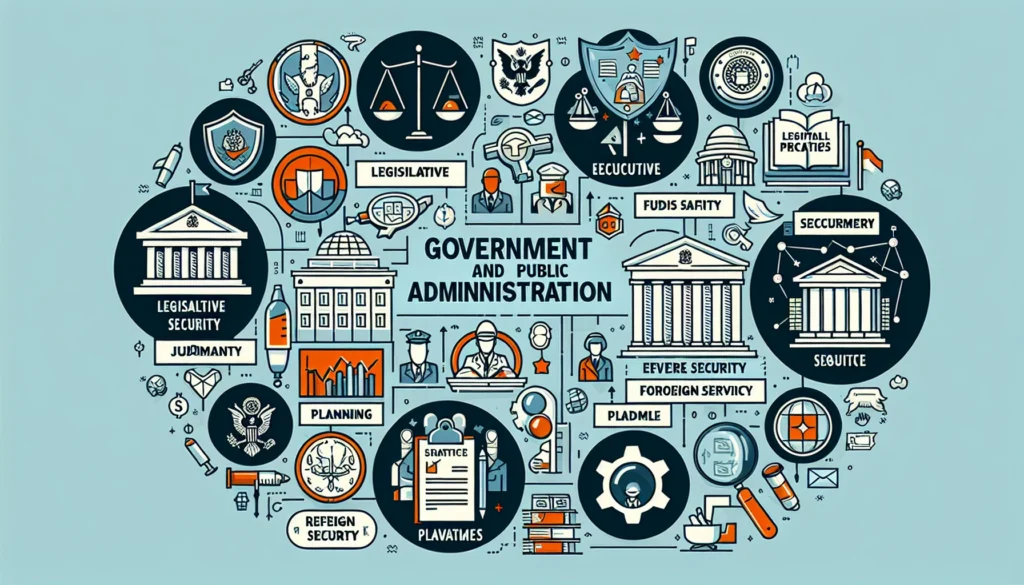Navigating the world of government and public administration can feel like trying to find a needle in a haystack—if that needle were a well-paying job and the haystack was full of bureaucratic red tape. But fear not! Understanding which roles fall under this cluster can be your golden ticket to a fulfilling career.
Table of Contents
ToggleUnderstanding Government and Public Administration
Government and public administration encompass a wide array of roles and responsibilities within the public sector. This includes positions that focus on policy making, program administration, and community services. Various occupations fall under this cluster, each contributing to the effective operation of government entities.
Administrative roles often revolve around organizational tasks. These positions manage departments, oversee staff, and ensure compliance with laws and regulations. Examples include city managers, county clerks, and budget analysts.
Policy analysis forms another vital area within government operations. Policy analysts research and develop recommendations regarding public initiatives. These experts play an essential role in shaping legislative decisions, whether at local, state, or federal levels.
Public finance specialists contribute by managing fiscal resources. These professionals ensure that government budgets are executed efficiently. They may work as auditors, financial officers, or grant coordinators.
Human resources personnel support the workforce of public institutions. These individuals oversee recruitment, benefits administration, and employee relations. Positions may include HR managers, equal employment opportunity specialists, and training coordinators.
Urban planners focus on the development of land use and community services. By analyzing demographic trends, they influence infrastructure projects and zoning laws. Architects, engineers, and consultants often collaborate with urban planners to create sustainable environments.
Moreover, educators and social workers play crucial roles in public administration. Educators facilitate learning in public schools, while social workers provide essential services to communities. Both professions bridge gaps in various sectors, enhancing quality of life.
Understanding the variety of careers within government and public administration helps individuals identify suitable paths for their skills and interests. Each role offers unique opportunities to contribute to society and foster community development.
Key Areas of Government and Public Administration
Government and public administration encompass multiple areas crucial for effective governance and community well-being. Understanding these key areas enables individuals to navigate career paths better.
Public Policy
Public policy entails the formulation and implementation of laws and regulations to address societal issues. This area includes extensive research and analysis conducted by policy analysts who assess potential impacts. Stakeholders engage in advocacy, aiming to influence legislative decisions. Decisions made within public policy significantly shape economic, social, and environmental factors in communities. Successful public policies require comprehensive evaluations and collaboration among government agencies, non-profits, and the public.
Public Finance
Public finance focuses on managing government revenue, expenditures, and budget processes. Specialists in this area analyze fiscal policies and ensure accountability for public resources. Budget analysts work diligently to forecast revenue and allocate funds appropriately. Effective public finance management supports economic stability and maximizes resources for community programs. Financial transparency builds public trust, creating a stronger connection between citizens and their government.
Administration and Management
Administration and management cover the efficient organization and coordination of government operations. It involves overseeing various departments and ensuring effective service delivery to the public. Administrators develop strategic plans aimed at enhancing operational efficiency. Human resources personnel play vital roles in recruiting and training staff to meet workforce demands. Prioritizing these human elements is crucial for maintaining morale and fostering a dedicated workforce committed to community service.
Roles and Responsibilities
Various roles exist in government and public administration, covering local, state, and federal levels. Each level serves unique functions essential to communities.
Local Government
Local government focuses on direct community needs and services. Responsibilities include managing public safety, public works, and education systems. City councils and mayors play key roles in decisions affecting residents. They oversee zoning regulations, permit issuance, and local budgets. Local governments provide services such as waste management and recreational programs, ensuring a high quality of life. Residents may engage with local representatives to voice concerns or suggest improvements, creating a direct link between officials and the community.
State Government
State government operates at a higher level, managing broader policy and administrative tasks. Duties encompass regulating education, transportation, and public health. Governors lead state governments, proposing budgets and policies impacting millions. State legislatures create laws relevant to specific regional issues. Furthermore, state agencies implement programs and services like workforce development and environmental protection. Citizens connect with state officials through public forums, leveraging opportunities to influence legislation.
Federal Government
Federal government plays a crucial role in national governance and policy enforcement. Responsibilities include defense, international relations, and economic management. The President, Congress, and Supreme Court form a system of checks and balances, ensuring the fair implementation of laws. Federal agencies oversee diverse functions such as environmental protection, trade relations, and social security. Engagement with constituents occurs through various channels, facilitating dialogue on national issues and shaping future legislative direction.
Career Opportunities in Government
Career opportunities in government offer diverse options for individuals aiming to make a difference in society. These careers provide a chance to engage directly with communities and influence public policy.
Civil Service
Civil service positions play a critical role in maintaining public infrastructure and services. These roles include policy makers, program administrators, and financial managers dedicated to effective governance. Various agencies seek individuals skilled in research, management, and community relations. Job security and benefits often accompany civil service roles, making them attractive for many. Examples of civil service jobs include city planners who develop land use strategies and administrative officers who oversee department operations. Passion for public service typically drives individuals in these positions, allowing them to contribute significantly to society.
Nonprofit Organizations
Nonprofit organizations serve as vital partners in government efforts, addressing community needs through advocacy and service delivery. These entities require staff for roles such as grant writers, program coordinators, and fundraising specialists to sustain their missions. Collaboration between nonprofit organizations and government enhances community outreach and resource sharing. Many nonprofits work on issues like education, healthcare, and housing, providing essential support to underserved populations. Individuals passionate about social justice often find fulfillment in these roles. Nonprofit careers offer opportunities for professional growth while enabling individuals to effect systemic change in local communities.





